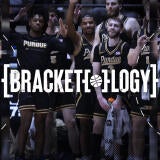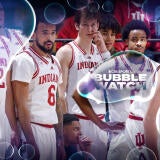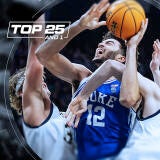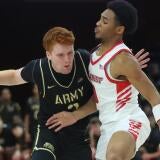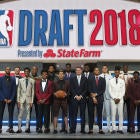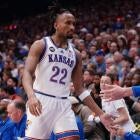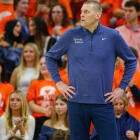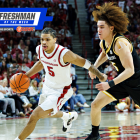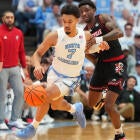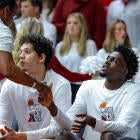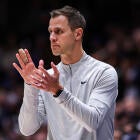College basketball rule changes: The NCAA can adjust the rulebook, but it won't impact the NBA Draft much
The NCAA's new policies concerning players entering the NBA Draft sound good on the surface, but won't matter much
Wednesday's news about major changes in college basketball made for a good headline, at least, about the NCAA adjusting policies to benefit elite high school and college basketball players by removing some of the bureaucratic burdens in their decisions whether to turn pro or not.
That is, until you read past the headline and into the actual details of what the NCAA announced.
And that's when it becomes pretty obvious that these major changes aren't so major after all, at least the ones that related to players' desires to make it to the NBA.
It's not that these rule changes are bad things. Wednesday's outpouring of criticism from college and pro basketball pundits of the NCAA's changes shouldn't be taken that way; NCAA news tends to always land with a thunk. The NCAA did put in some rules that certainly won't hurt these players and could, on the margins at least, help them.
But in a world where college basketball is increasingly seen as an extension of the NBA's minor leagues – a world view that, by the way, virtually ignores the 4,100 or so draft-eligible men's collegiate basketball players who aren't drafted into the NBA – the changes that the NCAA trumpeted as "profound and meaningful changes to college basketball" will hardly impact the NBA Draft or the prospects who are hoping to be selected.
Perhaps the best example of this "good on the surface, somewhat meaningless beneath" is one of the major headlines out of the NCAA's announcement. The NCAA said that players who declare for the draft but go undrafted will be allowed to return to college. This is a good thing! You never want a 19-year-old young man to, in the course of one Thursday night in June, have his dreams dashed of being drafted and then come to a realization that he can't return to college, work on his game, continue his education and try again next year. My heart went out to the talented Duke freshman point guard Trevon Duval when he went undrafted this June. Not only was the former top-10 recruit without an NBA team but he was also without the option of returning to college to improve during a sophomore season. That's a huge, huge bummer.
But look into the details: Most undrafted players are given a chance to prove their worth in the NBA's summer leagues. But the new NCAA rules decree that the deadline to make the decision to return to school is the Monday after the draft, so players are still stuck in a sort of limbo when they hit the deadline of having to make a decision. Most undrafted prospects won't look at it as a chance to return to college anyway. As ESPN's Adrian Wojnarowski tweeted in the wake of the NCAA's announcement, "Undrafted this year means you'll probably be undrafted or a late second-round pick next year – and back in the same precarious spot."
Look at Duval. He played for the Houston Rockets' Summer League team and then landed a two-way contract with the Milwaukee Bucks. Not ideal – not what his dream was a year ago when he entered college – but he still has his shot.
And then look a bit further into the details of the return-to-school rule change. Only players who were invited to the NBA combine before going undrafted would be allowed to return to school. Why not allow everyone who declares for the draft but goes undrafted return? Why only combine invitees? It doesn't make much sense. And it also means that not many players would be able to take advantage of this rule anyway. Only seven players who were invited to the 2018 NBA Combine and declared for the draft went undrafted: Duke's Duval, Arkansas' Jaylen Barford, Kansas' Malik Newman, UNLV's Brandon McCoy, Arizona's Allonzo Trier, and then two more players who had complicated collegiate eligibility issues anyway in Kansas' Billy Preston and South Carolina's Brian Bowen. As cool as this sounds, that players can return to school if they don't get drafted, it'll hardly make a difference in practice.
Another ballyhooed rule change from the NCAA: Collegiate players will be permitted to hire an agent after the completion of each collegiate season. The NCAA also extended that rule change for agent representation to "elite" high school prospects (as identified by USA Basketball); those elite high school players will be allowed to hire an agent starting on July 1 before their senior year of high school.

This is a good thing! But you'll notice, once you read a couple of caveats, that it's also a pretty small thing. One caveat is that this rule will only go into effect for elite high school prospects if and when the NBA and NBA Players Association remove the age limit and allow high school players to get drafted. So it won't happen until 2021 at the earliest that high school prospects will be allowed to hire agents.
And the other caveat is that…um…this is happening anyway. It's nice and all to take something like high school and college prospects having relationships with agents, which is currently against the rules, and put it above the board. Signing with an agent while playing college basketball is something that's technically illegal, but we all know happens. But let's not trumpet that as a major change in policy. It's like legalizing gambling, or relaxing laws on marijuana; it's legalizing things that were happening anyway.
There were a few more rule changes around the margins that'll affect the NBA Draft, like allowing agents to pay for meals and transportation for players and their families during the agent selection process. And there were also changes to the recruiting calendar and harsher penalties for rule-breaking institutions. The rule change that may have the biggest impact is allowing the NCAA to use information from law enforcement entities (i.e., the ongoing FBI investigation into college basketball corruption) without conducting a separate NCAA investigation. As USA Today's Dan Wolken tweeted, "This is essentially the NCAA giving itself subpoena power by proxy."
That's powerful stuff. The rest of these rules changes are, for the most part, not powerful stuff. They avoid the salient question of whether college athletes should be allowed to make money off their name and likeness. They bypass the big moral questions surrounding the amateurism model – the idea of some amateur athletes generating huge amounts of revenue for their schools while seeing a tiny fraction of it. And in practice, they will barely change how college prospects interface with the NBA draft.
Make no mistake: These rule changes are not bad things. They are, mostly, good things. Duke athletic director Kevin White on Wednesday released a statement on the rule changes: "These changes represent the first steps in addressing some of the biggest challenges facing college basketball."
He's right: These are first steps, but they are not particularly big steps. With the exception of the rule changes relating to the investigation of rule-breakers and the enforcement of NCAA bylaws, these rule changes should never be marketed as "profound and meaningful." Move along folks; nothing to see here. For the most part, this is business as usual.



